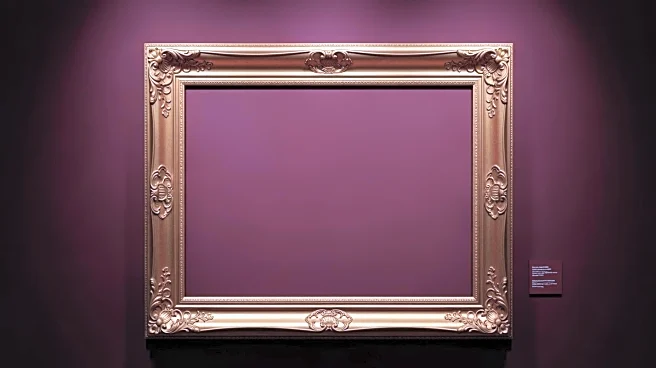What's Happening?
The Louvre Museum in Paris, one of the world's most renowned cultural institutions, has been closed following a robbery. According to France's culture minister, Rachida Dati, the incident occurred on a Sunday
morning as the museum was opening. The museum has confirmed its closure for the day due to 'exceptional reasons,' though it has not provided further details. Reports from French media indicate that jewelry was stolen by three masked men who allegedly used a freight lift under renovation to access the Apollo Gallery. This gallery houses what remains of France's crown jewels and is located on the side of the River Seine. Police are currently investigating the incident.
Why It's Important?
The robbery at the Louvre Museum is significant as it impacts one of the most iconic cultural landmarks in the world. The theft of items from the Apollo Gallery, which contains France's crown jewels, represents a substantial loss to cultural heritage and history. Such incidents raise concerns about the security measures in place at major museums and the protection of invaluable artifacts. The closure of the museum also affects tourism and the local economy, as the Louvre is a major attraction for visitors from around the globe. This event underscores the need for enhanced security protocols to safeguard cultural treasures.
What's Next?
As the investigation unfolds, authorities will likely review and potentially upgrade security measures at the Louvre to prevent future incidents. The museum's management may also face scrutiny regarding the current security protocols, especially concerning areas under renovation. The cultural sector and government officials might engage in discussions about funding and implementing advanced security technologies to protect national treasures. Additionally, the incident could prompt other museums worldwide to reassess their security strategies to prevent similar occurrences.
Beyond the Headlines
The robbery at the Louvre highlights broader issues related to art theft and the black market for stolen cultural artifacts. It raises ethical questions about the responsibility of museums to protect their collections and the role of international cooperation in recovering stolen items. The incident may also influence public perception of museum security and the value placed on cultural heritage. Long-term, this could lead to increased investment in security technologies and international collaboration to combat art trafficking.









